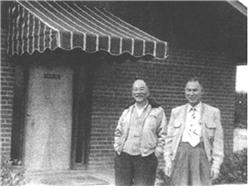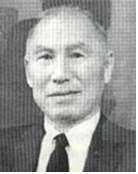Born in 1886 in Tongyeong, Gyeongnam, Kim Hyeong-soon graduated from Paichai School in 1901. He was proficient in English and worked for a year as the first Korean interpreter at the Incheon Customs Office before passing the interpreter exam for the Su-min-won (Korean Customs). In 1903, he came to the United States as an interpreter on the first immigrant ship and lived in Hawaii for 11 years, working as an interpreter on a sugarcane plantation. At just 19 years old, he was one of five interpreters and earned a high salary of $75 a month, while others were making only 10 cents an hour. He earned about $400 a month by working as a court interpreter and taking on various responsibilities for the Korean community.
In 1909, he returned to Korea, married Han Deok-se, and lived in Shanghai, China. When the Japanese government asked him to become an interpreter, he refused, fearing arrest, and left Shanghai for the United States at 1 AM. He was detained at the San Francisco Immigration Office for three months. In 1913, he moved to Los Angeles but was unable to find work, so he enrolled in high school and attended for six years. While studying, he also worked to support the independence movement.
In 1921, he started the Kim Brothers Company in Ridley with his friend Kim Ho. His proficiency in English played a significant role in the success of the business. He and Kim Ho were the first to develop nectarines and “Kim peaches,” which were cultivated in Ridley. The Kim peaches were larger than regular peaches and had smaller pits. He became a legendary figure in the agricultural region of Central California. He bought small trees for $1.25 and sold them for $2.50 a year later, while typical trees cost 75 cents. He generously paid Korean students $1.40 an hour to work for him, although some students would climb the trees and sing “Arirang” instead of working. He bought land for $200 to $300 an acre and sold it for $1,500 to $2,000, making a profit.
As a Christian, Kim Hyeong-soon established the Ridley Church and worked tirelessly day and night to support the provisional government in Chongqing in the quest for national liberation. He donated $100,000 to establish a scholarship program for Korean students, orphans, the elderly, and all Koreans. In 1950, he was elected as the Central Executive Chairman of the Korean National Association and dedicated himself to the association’s activities. In 1962, he sold his business for $1.4 million and began volunteering for the Korean community. He contributed $10,000, a significant amount at the time, to the construction of the Korean Community Center in Los Angeles. His daughter, Young-ok, married Kim Ho’s son, Kyung-han, making them in-laws. Until 1974, he sent $750 annually to a Korean orphanage and lived as a Korean without obtaining U.S. citizenship. Kim Hyeong-soon passed away in 1977 at the age of 92, and his funeral was held by the Korean National Association. The graves of Kim Hyeong-soon and his wife are located in the Korean cemetery they established in Ridley.


Leave a Reply